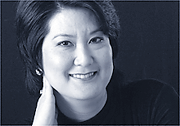Advertisement - Click to support our sponsors.


Changing Hawaii
THIS weekend two imposing and relentless forces collided in a jarring public confrontation, as partisan fans for each side cheered on and applauded every key point scored. Oh, the major head-butting that took place! Clash of the legal
titans: Justice Scalia
vs. the ACLUNo, we're not talking football.
In what could have been billed as the Super Bowl of legal debates, U.S. Supreme Court Justice Antonin Scalia squared off against Nadine Strossen, national president of the American Civil Liberties Union.
The two brilliant legal minds shared their often polar views on the U.S. Constitution, particularly the right to free speech, at Saturday's Davis Levin First Amendment Conference at the Japanese Cultural Center of Hawaii.
Ironically, the Zen-like quality of the usually serene gathering place in Moiliili was shattered by the chanting throng of picketers outside.
They enthusiastically protested everything from Scalia's pro-Bush vote in the presidential race to his anti-Hawaiian vote on the validity of the OHA elections.
Meanwhile, within the packed ballroom -- on a stage ringed by suited and grim-faced Secret Service agents -- lei-adorned Scalia and Strossen flanked moderator/attorney Roger Fonseca.
For two hours, queries and opportunities for rebuttal were lobbed at both participants, with the ultra-conservative justice seated, both literally and figuratively, on the right.
Among their disagreements:
Whether the Boy Scouts of America can bar homosexuals from its ranks. Scalia voted with the majority on the high court, believing that the organization's members had a right to associate with those with "common values," and therefore the Boy Scouts did not have to accept gay troop leaders or scouts. The ACLU argued that sexual orientation should not be used to exclude an otherwise qualified person from a group that often assembles in places of public accommodation.
Who should decide whether a business like a pornography store can open in neighborhood. Scalia said obscenity is not protected by the First Amendment and that each community should be the ultimate authority of acceptable standards. Strossen said a porn shop, or even a racy Internet site, should not be arbitrarily banned or censored; instead each individual should have the free choice of deciding whether or not to patronize that enterprise.
Who was the most inspirational of our Founding Fathers? Scalia: George Washington. Strossen: Thomas Jefferson.
Despite such distinct differences, the sparring jurists (who addressed each other as Nadine and "Nino" while doing battle in Honolulu) agreed on at least three things.
That the burning of Old Glory is a form of freedom of speech that Congress should not preclude by passing a law to prevent flag-desecretion.
That it should not be a crime for abortion opponents to "sidewalk counsel" and hand out leaflets at health facilities, because that would impede their right to free speech.
And that, while there is no explicit priority to the importance of provisions in the Constitution, if a democracy were made to choose, it should select the First Amendment: "Congress shall make no law respecting an establishment of religion, or prohibiting the free exercise thereof; or abridging the freedom of speech, or of the press..."
A definite touchdown in this journalist's eyes.
Diane Yukihiro Chang's column runs Monday and Friday.
She can be reached by phone at 525-8607, via e-mail at
dchang@starbulletin.com, or by fax at 523-7863.